Thread replies: 20
Thread images: 5
Anonymous
2015-12-21 06:36:41 Post No. 441675
[Report]
Image search:
[Google]
Anonymous
2015-12-21 06:36:41
Post No. 441675
[Report]
Why was teleology basically taken for granted in Hegel's philosophy?
I've only read books *about* Hegel, but it seems central to his system that the world is tending towards some goal, some end point, and that this end point makes sense of all the intermediary stages leading up to it. Was it merely an assumption on his part that the universe has an intrinsic endpoint that it develops towards? And was this assumption not questioned because, at that stage of natural science, it seemed incontestable that nature contains some beings (organisms) that can't be understood except from a teleological point of view? Is this assumption - and thus the Hegelian architecture built upon it - obsolete in the light of contemporary, especially evolutionary, science?







